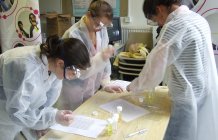
Children from 6 Devon schools discover how drug tests are carried out at the Olympics.
Devon school children discover the science behind the games
An Olympic related anti-doping event was held for students from six Devon schools in Sport and Health Sciences on Wednesday 18th April. The Department’s research into using eye-trackers and beetroot juice were just two of the topics that were discussed.
The event is one of a series described as Bringing Science to the Games supported by GlaxoSmithKline who are providing the laboratory for the drug tests at London 2012. Cheating goes back to the original Games at Olympia, but it took until 1966 before the authorities started to test for drugs. Today there are 200 banned substances.
Peter Evans and Alison Smith of UK Anti-Doping (UKAD) spoke about their roles which are to promote clean sport and educate athletes and others about which substances are banned and the dangers of taking drugs. They also described how the tests are carried out. The students were given different examples of where athletes had been thought to have taken a banned substance and then asked how they would have dealt with the situation and what penalty they would have imposed.
Double gold medal winner Graham Edmunds spoke about his route into Paralympic swimming. He described winning his first gold medal in Athens as “The Best Thing Ever”. He also knew that he wanted another medal, even though it would mean four years of training to be selected for Beijing. In that relay race he broke his own Personal Best time and he described the wonderful feeling of being part of a team that was competing for our country.
Researcher scholar Bert Bond used a cycling test to show the students the difference in the types of fitness London 2012 athletes will need for success. How you prepare for a sprint race compared to how you train for a Marathon while measuring the oxygen being consumed by muscles.
The students enjoyed the day and Dr Stephen Bailey remarked on their interest in his talk on beetroot juice and the thoughtfulness of their questions. The teachers who came along told us that they had learnt things and were interested to hear about the current research that is being carried out as well as seeing around the campus and the equipment in the lecture rooms and labs.
Professor Craig Williams of the Children’s Health and Exercise Research Centre (CHERC) said:
“We are pleased to be part of these events and to welcome students from local schools. We hope that the event will encourage young people to continue to study science and to aim to come to University. I am also keen to encourage them to take part in the various research projects that we carry out here in this unique centre.”
Date: 30 April 2012
